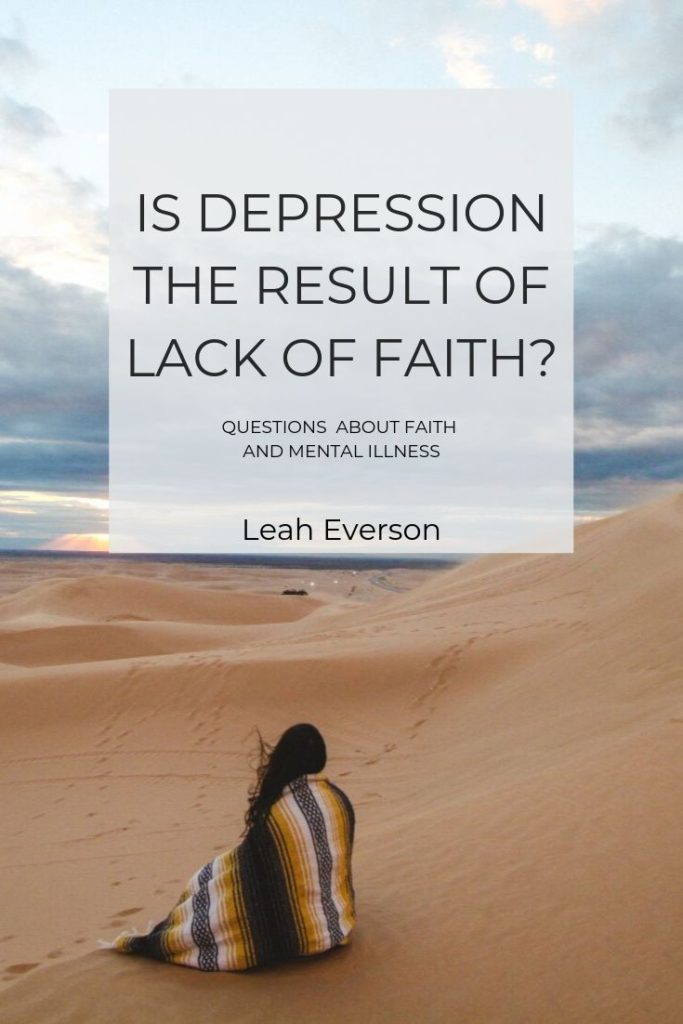
“If you just believed God you wouldn’t feel that way.”
I was walking with a friend when I confided in her my decision to go back on my antidepressants. I was nervous — this isn’t something I was prepared to share with many people — but I trusted her to care for me and to handle this information. Her response stunned me.
“I think you just need to trust God more.”
I felt completely misunderstood, judged, and unsafe. I had hoped for compassion about my struggles and instead received her opinion about my relationship with God.
The expression is common enough. Most of us who have experienced depression or anxiety and confided it to another Christian have heard this response in one form or another. It may be a well-meaning statement, their way to offer hope. But the expression to “just believe” is instead experienced by the sufferer as a gross misunderstanding of their experiences and a judgment on their faith.
When we, the ones who took a step to trust another person with our deep, dark secret of choosing to go on a medication, or seeking therapy, or simply receiving a diagnosis of a mental health disorder, receive a response that we just need to have more faith, it can be devastating to our innermost self. Confirming in our hearts what we feared to begin with: Our faith has failed. This is all our fault.
The reality is, this is not true. There are instead a number of assumptions driving these type of judgments.
The assumption is that the person with depression or anxiety or any other mental illness does not believe God or believe in God.
The assumption is that the person struggling with mental illness does not pray, look to God for healing, or trust Him at all.
But this is simply not true. Throughout Scripture we see individuals struggle with hard feelings, doubts, and fears, yet they continued to have faith. Not only that, but God hears their cries and responds with grace, comfort, and healing. The same is true for believers today.
Fact: Even the psalmists struggled with feelings of hopelessness, anxiety, and despair. Turn to any page of the Book of Psalms and you will most likely find a prayer of lament or complaint.
Psalm 4:1-2
Answer me when I call to you,
my righteous God.
Give me relief from my distress;
have mercy on me and hear my prayer.
Psalm 6:1-3
Lord, do not rebuke me in your anger
or discipline me in your wrath.
Have mercy on me, Lord, for I am faint;
heal me, Lord, for my bones are in agony.
My soul is in deep anguish.
How long, Lord, how long?
Psalm 10:1
Why, Lord, do you stand far off?
Why do you hide yourself in times of trouble?
I will spare sharing every single psalm, by now you should get the idea, but some of the statements from the psalmists are very uncomfortable. Yet they are in the Bible. I think of Psalm 6:6-7 in particular as it sounds like my own experience of depression when I was a teenager battling social anxiety and rejection:
I am worn out from my groaning.
All night long I flood my bed with weeping
and drench my couch with tears.
My eyes grow weak with sorrow;
they fail because of all my foes.
I imagine someone telling me to look up and that I would just feel better if I “just trusted God.” But the reality is that the psalmists were trusting God. They were praying to God about their struggles. They were putting their trust in God that He would make them feel better. They were lamenting to Him about their circumstances because they believed He could do something about it. In the moment, though, they despaired. In the moment, they experienced symptoms of depression. They trusted God AND they experienced discouragement. The two can go hand in hand.
Fact: The psalmists experienced deep, dark feelings AND they trusted God.

We often don’t know how God answered His people in the Psalms, but we do see the psalmists’ faith in God as they lament. The Psalmists frequently state that God hears them or they remember what He has done in the past trusting He will do it again. They state an expected outcome or affirm who He is.
These affirmations of faith are side by side with expressions of discouragement.
Psalm 4:8
In peace I will lie down and sleep,
for you alone, Lord,
make me dwell in safety.
Psalm 6:9
The Lord has heard my cry for mercy;
the Lord accepts my prayer.
Psalm 10:14
But you, God, see the trouble of the afflicted;
you consider their grief and take it in hand.
The victims commit themselves to you;
you are the helper of the fatherless.
There is another assumption made by those who tell others to trust so that they won’t have mental illness: The assumption is that those who trust God will never experience doubts, discouragements, anxieties, or depression. That is simply not the case. If it were, the psalmists would not have written these words as our song book.
We are often not comfortable with the gray area that comes with faith. Faith doesn’t always look like cheerfulness and roses. It doesn’t always imply that everything will go well and that we will always feel good. If it did, then Jesus would not have warned us that “in this world you will have trouble” (John 16:33). The good news these psalms bring those of us who deal with mental illness is that we can be honest about our feelings before God. If we are not honest with our fears, hurts, and sadness, most likely the depression will only grow. The darkness will feel more oppressive. We will despair. But in voicing our feelings to God, he hears us, comforts us, helps us.
I have long waited for complete healing from depression and it has not come (yet). But I may be in good company, some have speculated that the Apostle Paul struggled with it as well. That depression or anxiety of some form was the “thorn in his side” (2 Corinthians 12:7). And yet his faith continued. Ours can, too. In some ways our weakness is a blessed reminder that we need the Holy Spirit. We do not have the strength in ourselves to get better by “just believing,” but we believe through our tears and our cries of lament. We believe and we cry out and we are given strength for a new day.
The more I have talked about my discouragement, the more my friends understand. The more I talk about my faith within depression, the less judgment comes my way. In fact, the opposite is true. The more I share, the more others share with me. And the more we then seek God together.
So keep crying out, friends. Keep mourning and casting our cares on God who cares for us, can handle our doubts, sees our suffering, and loves us through it all.
I will leave you with one of my favorite passages. One that I carry every day. May God sustain you through it as well.

I remain confident of this:
I will see the goodness of the Lord
in the land of the living.
Wait for the Lord;
be strong and take heart
and wait for the Lord.
Psalm 27:13-14

No Comments Yet